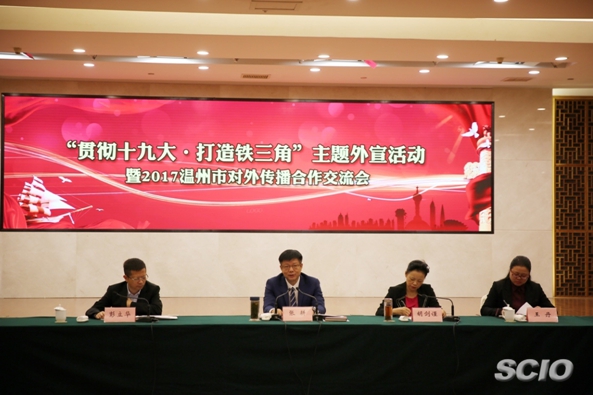Wenzhou reports 8.4 percent GDP growth in Q3
By Gao Zhan
Wenzhou's GDP in the third quarter grew by 8.4 percent year-on-year, Mayor Zhang Geng said at a press conference on Nov. 14. The ratio of its non-performing loans decreased from 4.68 percent to 2.17 percent, he added.
|
|
|
Zhang Geng (2nd L), mayor of Wenzhou, briefs the media on Wenzhou's economic and social development on Nov.14, 2017. [Photo by Gao Zhan/China SCIO] |
"We must seize the opportunity in transition and accelerate development in the new era," Zhang said.
When China began its reform and opening up in 1978, Wenzhou, Zhejiang Province, was the first city in China to set up private enterprises as well as companies with shareholders. Several years later, Wenzhou not only took the lead in developing a commodity-based economy and small businesses, it also set a model for the reform and opening up in China.
Zhang said Wenzhou had begun speeding up its transformation and upgrading. On the one hand, it is transforming its traditional industries; on the other hand, new industries were encouraged to develop, especially in the technology industry and the intelligent manufacturing industry, he said.
Wenzhou is one of the three major cities of Zhejiang Province with a population of 9.12 million, and in recent years it had started an urban facelift. Over the past two years, the city tore down illegal buildings in areas totaling 35 million square kilometers and shut down 200,000 unlicensed businesses.
Zhang said Wenzhou has also been implementing the Belt and Road Initiative, with a total of 380,000 Wenzhou natives working in the countries along the Belt and Road. In addition, Wenzhou has set up three national-level and one provincial-level overseas economic trade and cooperative zones. In the third quarter of this year, Wenzhou's export revenue with the Belt and Road countries reached 30.5 billion yuan (US$4.60 billion), a year-on-year increase of 12.4 percent, Zhang said.
